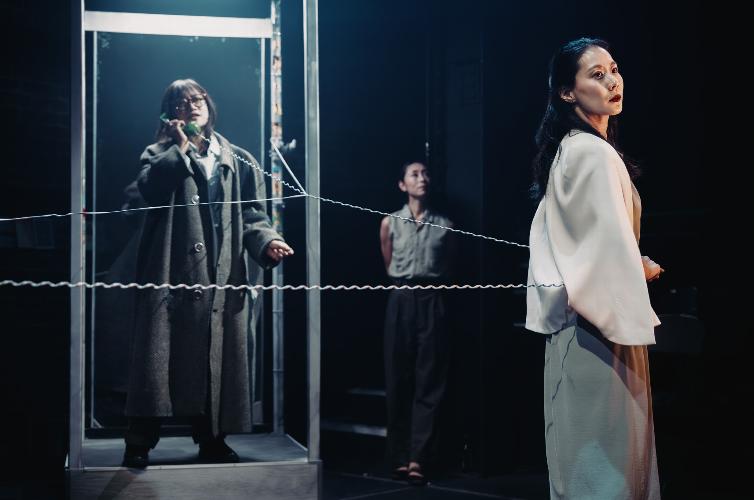This stage adaptation of Haruki Murakami’s book tells the story of the intertwined lives of Sumire, K, and Miu, each experiencing a level of passion for one another in a complex web of love and lust. Each of them uncovers the truth about themselves and their relationships, through Miu’s divulging of her traumatic experience of sexual assault, Sumire’s grapple with her sexuality and need to write, and K’s reflection of his own choices and relationships in the shadow of his love for Sumire. Questions of morality, existentialism, and love are all explored through this abstract telling of an interesting tale.
This piece of theatre is visually captivating throughout. Bryony Lavery’s adaptation of the original text is a beautiful love letter to literature: we are presented with a book brought to life in a most stunning experience, both through its beautiful script and gorgeous use of technical theatre. Though Malcolm Rippeth’s powerful lighting coupled with Daniel Balfour’s sound design serve to immerse us in the art (to call it simply a piece of theatre doesn't seem to do the vision justice), it is Sonoko Obuchi’s video design that is the star of this show. The way the beautiful animations interact with the live action on stage is breathtaking; it captures deep emotion and hilarious motifs with ease, acting itself as another talented member of the cast.
The play is also directed by Melly Still with an intense emphasis on physicality, underpinning some of the complex themes of separation of heart, mind and body throughout the piece. This cast work together with impressive synergy, never missing a beat of the quick and powerful choreography; they move through the minimalist space as one, and some of this show’s most memorable moments are those of pure movement and music.
Though gifted performers, what feels generally missing in this piece is a stronger connection between the actors and the script itself; perhaps the employment of a dramaturg may have helped push this production to the next level. Each performer clearly has an understanding of sharp comic timing, but we only get glimpses of this talent rather than a consistent display, and we long for a little more nuanced characterisation throughout; it is because we see the potential of the script and performers so clearly there that its lack is noticed so starkly. Lavery’s script is very special and deserves to have every last ounce of its potency realised.
That being said, a stand-out moment in the play comes when Natsumi Kuroda as Miu transfixes every single audience member with a heart-wrenching expression of her trauma – she deftly moves through straightforward narrative and more abstract surrealism with such confidence that we remain caught in her story for the duration. The deathly silence of the auditorium that follows is the fruit of such a mesmerising performance that is considered, heartfelt, and entrenched in understanding.
With depth still to be drawn out, Sputnik Sweetheart is a moving and unique theatrical experience that is certainly worth catching while it runs at the Arcola Theatre, until 25th November.
Review: Penny Lane Photo: Alex Brenner

